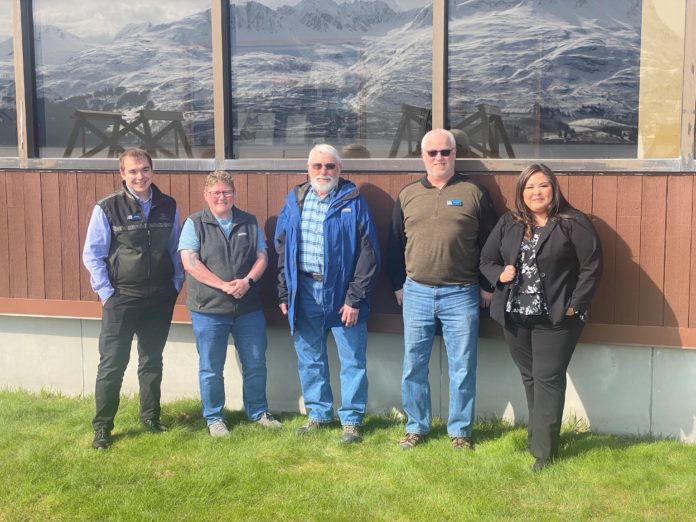
During its annual board meeting from May 4 to May 5, the Prince William Sound Regional Citizens’ Advisory Council (PWSRCAC) elected the officers who will serve from now until May 2024. Robert Beedle — who also represents Cordova District Fishermen United — as well as Angela Totemoff for the Community of Tatitlek, were both tapped as members-at-large. Amanda Bauer, of Valdez, was elected as vice president.
Bauer has lived in Valdez for 28 years and works for a glacier and wildlife cruise company in the area. Her love of the region and decades there means the issues PWSRCAC address are extremely important to her.
Bauer said that while many of her projects last for more than one year, this year she is feeling focused on an April 24 report commissioned by PWSRCAC, which found that “there currently is an unacceptable safety risk to the (Valdez Marine Terminal), and consequently no reasonable assurance that the VMT is operating safely and in compliance with its regulatory requirements.”
The report goes on to say that inadequate resources, budget cuts and reductions, and reduced oversight were common themes behind the issues raised in the report. The board has accepted this report and endorses its recommendations. Like most nonprofits, the board sets the direction of the entity and the staff carries out next steps.
The independent report was commissioned after past and present Alyeska employees came forward with concerns. An outside consultant with extensive experience in the area was brought in to facilitate the report.
Bauer said that as Alyeska addressed the issues from the report she hopes that PWSRCAC is involved, despite this not being mandatory. PWSRCAC is an advisory body, and not a regulatory one. So far, Bauer said she is pleased with the response from Alyeska in addressing the report, but acknowledges progress won’t happen quickly.
“It’ll be a lot of work,” she said.
As a Valdez resident, Bauer said she knows how important it is that the terminal operates as safely as possible, not only for the workers but for everyone in the state — dependent on what she described as “still the financial lifeline of the whole state.”
Beedle also understand how important PWSRCAC is to the region, and is invested in finding solutions to the issues raised in the April report.
Beedle was born and raised in Cordova — and even helped distribute The Cordova Times as a kid. He also fishes in the region, and worked on the 1989 Exxon Valdez oil spill clean-up.
“It’s my home, I care,” he told the Cordova Times.
As budgets were cut, regulatory agencies were not able to do their jobs and maintenance was deferred. Beedle said that there are competent people within both the Alyeska Pipeline and the regulatory bodies, but budget pressures and worker shortages have contributed to issues.
Beedle said that PWSRCAC doesn’t want to put anyone out of a job or damage the oil industry — the council just wants to bring attention to the issues and get Alyeska, regulatory bodies, and oil companies to maintain standards and safety.
“Nothing against the oil company, we need them, we just need them to operate safe,” he said.
Board members from PWSRCAC are going to Washington D.C. to meet with Alaska’s Congressional delegation about how safety concerns can be met.
The other elected executive committee members include: President Robert Archibald, who represents the City of Homer; Treasurer Wayne Donaldson, representing the City of Kodiak; and Secretary Bob Shavelson, representing the Oil Spill Region Environmental Coalition. Ben Cutrell, who represents the Chugach Alaska Corporation, is a member-at-large.
Each of the aforementioned officers, including the members-at-large now serving, were re-elected into positions they had held over the previous year of service.
The PWSRCAC is an independent, nonprofit corporation that works to promote environmentally safe operation of Alyeska’s Valdez Marine Terminal and the associated oil tankers. Member organizations are regional communities and organizations that were affected by the 1989 Exxon Valdez oil spill, including fishing, environmental, recreation, aquaculture, and Alaska Native groups. PWSRCAC has offices in Valdez and Anchorage.
During the annual May meeting, officers are elected, board seats and committee appointments are confirmed, and the budget is approved. The fiscal year is from July 1 to June 30. Short-term objectives of PWSRCAC are determined by the projects included in the budget for the upcoming year.
“The Council believes firmly that our greatest successes result from citizens, industry and regulators working together to maintain and improve our safeguards designed to prepare for and prevent future oil spills,” said Executive Committee President Robert Archibald in a press release about the election. “It is crucial we not forget the reasons that led to the creation of this organization and continue to work together to maintain the record of safe, efficient transportation of crude oil through our region. I am honored to lead our board for another year as we work toward our shared goal of protecting our communities, economies and environment.”





